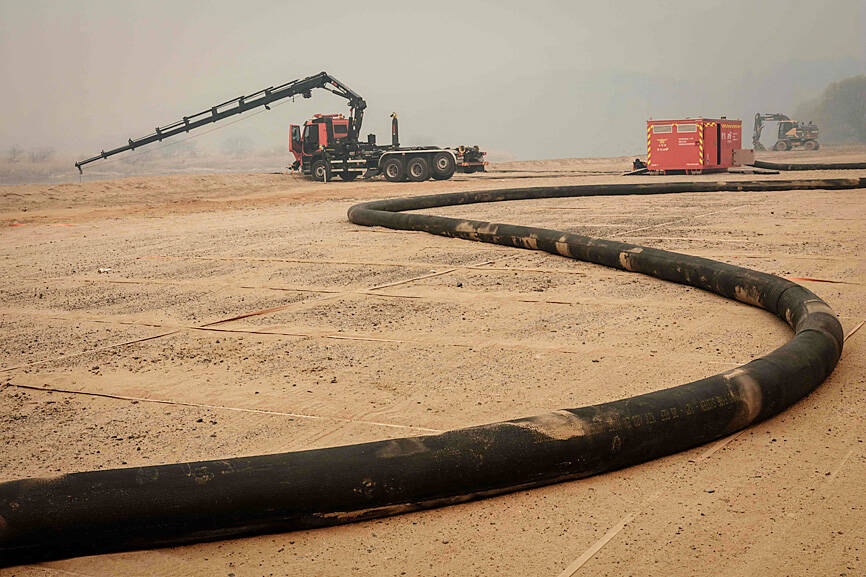Wind-driven wildfires that were among South Korea’s worst ever have ravaged the country’s southern regions, killing 24 people, destroying more than 200 structures and forcing 27,000 residents to evacuate, officials said yesterday.
The death toll included a pilot who died after a helicopter crashed during efforts to contain a blaze in the southeastern town of Uiseong, one of the hardest-hit areas.
The aircraft had no other crew members.

Photo: AFP
Police said that most of the dead were in their 60s or 70s.
The South Korean National Fire Agency said at least 26 people sustained varying degrees of injuries.
An ancient Buddhist temple, houses, factories and vehicles were destroyed in the wildfires, which had burned 17,535 hectares, the government’s emergency response center said.
In a televised address, Acting South Korean President Han Duck-soo said that the wildfires that began on Friday last week were worse than many previous ones.
“Damage is snowballing,” Han said. “There are concerns that we’ll have wildfire damages that we’ve never experienced, so we have to concentrate all our capabilities to put out the wildfires in the rest of this week.”
Han said that crews struggled to extinguish the wildfires because strong winds swept the areas overnight.
He also said about 4,650 firefighters, soldiers and other personnel were working yesterday with the help of about 130 helicopters, adding that “a small amount” of 5mm to 10mm of rain was expected today.
As of Wednesday evening, firefighters were tackling at least four wildfires, including in the southeastern coastal town of Yeongdeok, which alerted residents of the nearest village to evacuate to an indoor gymnasium.
Strong winds and smoke-filled skies forced authorities in the southeastern city of Andong to order evacuations from two villages, including Puncheon, home to the Hahoe folk village — a UNESCO World Heritage Site founded in the the 14th or 15th century.

The CIA has a message for Chinese government officials worried about their place in Chinese President Xi Jinping’s (習近平) government: Come work with us. The agency released two Mandarin-language videos on social media on Thursday inviting disgruntled officials to contact the CIA. The recruitment videos posted on YouTube and X racked up more than 5 million views combined in their first day. The outreach comes as CIA Director John Ratcliffe has vowed to boost the agency’s use of intelligence from human sources and its focus on China, which has recently targeted US officials with its own espionage operations. The videos are “aimed at

STEADFAST FRIEND: The bills encourage increased Taiwan-US engagement and address China’s distortion of UN Resolution 2758 to isolate Taiwan internationally The Presidential Office yesterday thanked the US House of Representatives for unanimously passing two Taiwan-related bills highlighting its solid support for Taiwan’s democracy and global participation, and for deepening bilateral relations. One of the bills, the Taiwan Assurance Implementation Act, requires the US Department of State to periodically review its guidelines for engagement with Taiwan, and report to the US Congress on the guidelines and plans to lift self-imposed limitations on US-Taiwan engagement. The other bill is the Taiwan International Solidarity Act, which clarifies that UN Resolution 2758 does not address the issue of the representation of Taiwan or its people in

US Indo-Pacific Commander Admiral Samuel Paparo on Friday expressed concern over the rate at which China is diversifying its military exercises, the Financial Times (FT) reported on Saturday. “The rates of change on the depth and breadth of their exercises is the one non-linear effect that I’ve seen in the last year that wakes me up at night or keeps me up at night,” Paparo was quoted by FT as saying while attending the annual Sedona Forum at the McCain Institute in Arizona. Paparo also expressed concern over the speed with which China was expanding its military. While the US

SHIFT: Taiwan’s better-than-expected first-quarter GDP and signs of weakness in the US have driven global capital back to emerging markets, the central bank head said The central bank yesterday blamed market speculation for the steep rise in the local currency, and urged exporters and financial institutions to stay calm and stop panic sell-offs to avoid hurting their own profitability. The nation’s top monetary policymaker said that it would step in, if necessary, to maintain order and stability in the foreign exchange market. The remarks came as the NT dollar yesterday closed up NT$0.919 to NT$30.145 against the US dollar in Taipei trading, after rising as high as NT$29.59 in intraday trading. The local currency has surged 5.85 percent against the greenback over the past two sessions, central